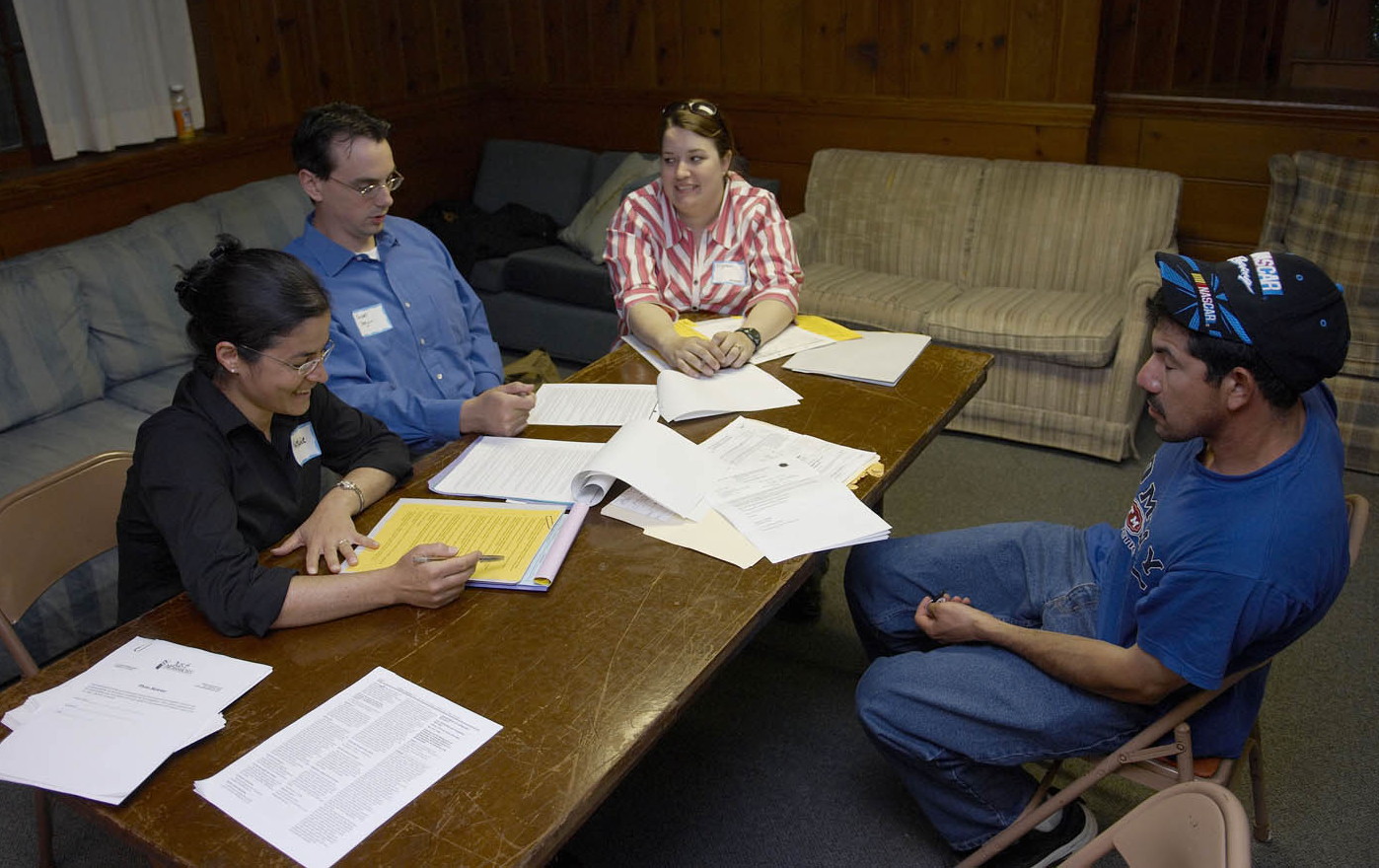Attorneys with Just Neighbors help immigrants resolve legal problems

When local immigrants need legal help, Just Neighbors provides a lifeline. The nonprofit organization based in Bailey’s Crossroads was established 15 years ago “in response to the lack of immigrant legal services for the community,” says Executive Director Rob Rutland-Brown.
Just Neighbors helps people apply for green cards and other documents they need to stay and work in the United States, assists refugees from war zones seeking asylum, and helps families stay together. In some cases, people just need assistance figuring which forms they need to submit and how to fill them out. Other cases are more complicated.
In one example, the organization helped a woman from Bolivia trapped in an abusive relationship. When her husband threatened to kill her and her children, Just Neighbors helped her and her 19-year-old son testify against the man in court and then obtain visas allowing them to stay in the United States. Had they been sent back to Bolivia, the woman feared they would be killed. Being allowed to stay here allowed her son to take advantage of a soccer scholarship at a local college.
Victims of and witnesses to violent crimes are eligible to stay in the United States if they cooperate with the police, and Just Neighbors helps people in these situations negotiate this process.
That’s what happened with Edgar, an immigrant from Honduras who lives in Annandale, who was badly injured when he tried to break up a fight at a friend’s house. He agreed to work with the police, and the man who stabbed him is still in jail.
 |
| Rutland-Brown |
Just Neighbors “helped me with everything,” he says. “They told me what I needed to do” to get visas for himself, his wife, and children.
Edgar, his wife, and eldest daughter had come to the United States 14 years ago to escape the poverty and crime in Honduras, which has the world’s highest murder rate. They now have four children, ages 6 to 19, and he works in maintenance at an Arlington apartment complex.
“I appreciate this country,” says Edgar, who still has family in Honduras and says, “every day I pray to God to protect them.” In two more years, he will be eligible for a green card and in five years he’ll be able to apply for citizenship.
Just Neighbors takes on about 800 cases a year. The organization has three attorneys on staff and another 200 chip in on a voluntary basis.
While Just Neighbors only deals with legal issues, it does have a social work intern on staff to help clients connect with other organizations that can help with housing or other services. It also hosts a counselor once a week from the nonprofit Women’s Center in Vienna.
Just Neighbors was founded as a ministry of the Arlington District of the United Methodist Church, but the program does not have any religious components and “is open to people of all faiths and backgrounds,” says Rutland-Brown.
Clients come from about 115 countries, with the largest numbers from El Salvador, Bolivia, Honduras, Ethiopia, Sierra Leone, Iraq, Iran, and Afghanistan.
Just Neighbors has helped many immigrants from El Salvador obtain “temporary protective status,” which is available to people who came here after a hurricane ravaged the country in 2001, Rutland-Brown notes. They are allowed to stay, regardless of their legal status, because the United States declared it dangerous for them to return to El Salvador, but they must renew their status every 18 months.
About a third of Just Neighbors’ funding comes from federal, state or county funds; another third is from private foundations; and the remainder comes from donations. Only 2 percent is from client fees. Clients pay a one-time fee of $50 but the fee is often waived for people who can’t afford it.
The need for services is growing, while governments are cutting their budgets and the recession has put a damper on donations. Just Neighbors receives about 150 calls a month—more than double it received just two years ago—and can only take on about 25 percent of those requesting aid, says Rutland-Brown.
Those whom the organization can’t help are often referred to other organizations, such the Tahirih Justice Center, which helps immigrant women escape abusive relationships, or the Legal Aid Justice Center, which helps day laborers resolve disputes with contractors.
Rutland-Brown has seen some fallout from the anti-immigration policies adopted in Prince William County. Clients seeking help at Just Neighbors’ satellite office in Woodbridge “are more fearful of going to the police for help,” he says. The group also has an office in Herndon.
“We’re helping people take advantage of existing law, not skirt the law,” he says. Some clients had paid hundreds of dollars to unscrupulous lawyers who promised things they weren’t eligible for. In contrast, Just Neighbors’ attorneys tell potential clients upfront whether they can help or not.
Helping people obtain legal status “prevents them from living underground,” he says, and it’s rewarding to see clients’ relief when “they see someone is here to help them.” He believes living in a community with people from different cultural backgrounds and experiences enriches everyone’s lives.
“People who work here enjoy meeting people from other cultures,” he says, noting that one volunteer’s first client was a woman from the Congo who brought eight children to her appointment. She was seeking help to bring her mother to the U.S. to help with child care. That session was a bit chaotic, but they eventually bonded and the volunteer give Christmas presents to all the kids.
“Working here you really get to know people—what kind of journeys they’ve taken to get here, what they’ve given up, and what sacrifices they’ve made,” Rutland-Brown says. “We’re all motivated and inspired by that interaction.”


Oh please. When will common sense kick in and people realize its not about anti-immigration but anti ILLEGAL immigration, aka law-breakers. It is not that hard to comprehend.
If Just Neighbors supports legal immigrants, then good for them. However, I am tired of people & the media mixing legal immigrants with illegal immigrants. My parents worked hard and came here legally.
Love legal immigration. I suppose if these folks can get these people into the legal process and help them get legal status, OK. But do they teach them to respect the law in all cases – even if they lose their cases/appeals and are told by our legitimate governnment they have to leave? Or do they turn a blind eye? I wonder, because this country has laws that need to be enforced even if you are on the wrong side of them.
I pretty much agree with the previous comments. I, too, like practically everyone in the U.S., come from an immigrant family. They came here legally, learned the language and became a credit to their community. I wish I were seeing more of that in my neighborhood, but I'm not. Just Neighbors appears to believe the trouble is with the law of the land, not with those who have broken it.